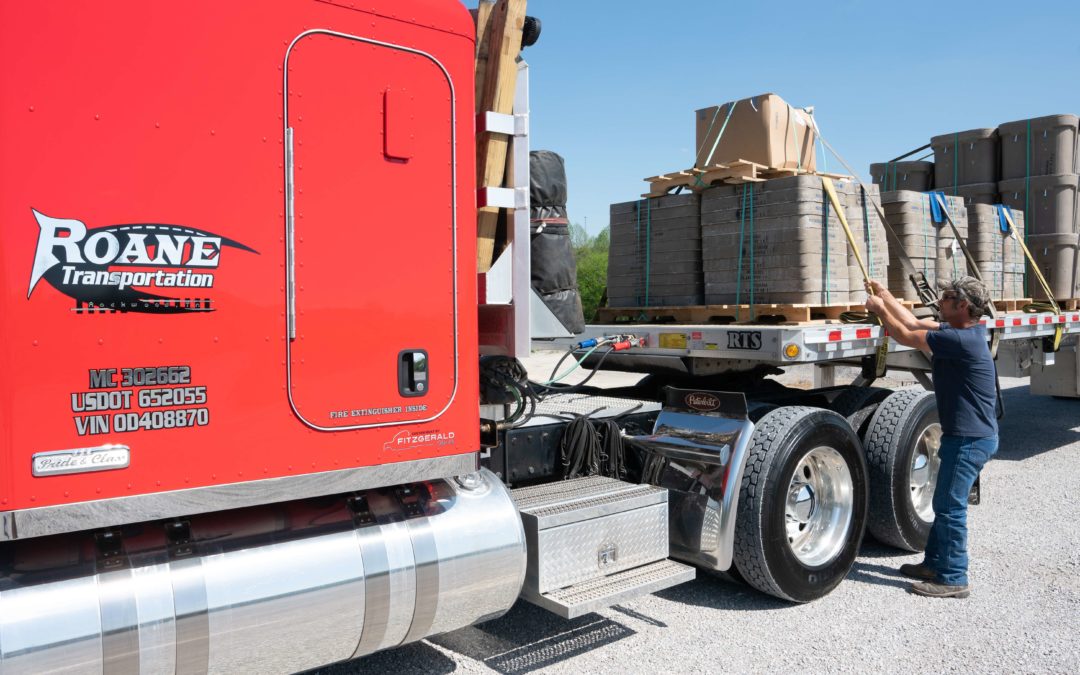Flatbed truck drivers put as much if not more miles on their vehicles than drivers in any other industry. But more miles on the road means more chances for accidents, which means your vehicle must be as safe as possible when you head out on your next trip.
Along with adhering to traffic laws and speed limits, there are plenty of ways to be safer when you’re operating your flatbed truck. Here’s a list of simple ways truck drivers can be safer when they’re transporting the goods and cargo that keep our country running.
Staying safe while driving a flatbed
Secure your load
What makes flatbed trucking such a unique industry is also what makes it potentially dangerous. So, no matter what kind of cargo you are transporting, you need to make sure it’s been properly secured before you hit the road. Regardless of the value of your cargo, properly strapping down your vehicle is, first and foremost, a matter of safety for you and the other drivers sharing the road with you.
This might take more time and be an annoyance, especially during the winter months, but it’s crucial to do a pre-trip inspection of all points where your cargo is tied down. Make sure you secure the load with tie-down straps, a heavy tarp, and bungee cords. Always attach your bungee cords with the hook facing away from the tarp to prevent any damage that could occur if the cord snaps.
Roadside safety
Performing any sort of vehicle maintenance on the shoulder of a highway or interstate is always an unnecessary danger. If at all possible, avoid re-securing or tarping loads on the side of a roadway. Find a nearby rest stop, or take the nearest exit and find a parking lot to perform needed maintenance. Especially if it’s dark or in inclement weather, you can’t assume other drivers can see you.
If you are forced to pull over on a roadway, be sure to wear a reflective jacket or outerwear so you can be more visible to other drivers.
Loading and unloading safely
This is an area where drivers are at a safety risk considering the large sizes of cargo being transported. You’ll want to inspect how level the area is where you’ll be loading or unloading, as well as making sure you stay clear of machinery or debris on the ground. You’ll want to identify any potential hazards before you start loading or unloading your cargo.
What to inspect on your flatbed
At the end and beginning of each workday, you’ll want to inspect your vehicle to prevent major accidents before they start. Knowing where to look, though, is critically important.
Tires
Tires can be a vulnerable area on your vehicle, so be sure to check to make sure there are no embedded objects in the tread, no matter how small. Check for cuts and abrasions, especially if the steel belting is exposed. Also, check for objects wedged between the duals. They should be removed immediately.
Wheels
Loose or missing lug nuts could mean disaster when you’re out on the road, so check for these on your wheels before and after every trip. Wheels that have been bent or damaged by curbing need to be checked for alignment as well.
Valve Caps
Like the aforementioned lug nuts, check for loose or missing valves and always discharge a small amount of air before replacing a valve cap. Also, be sure to use metal flow-thru stem caps and install them correctly.
Test to avoid engine problems
Test for warning signs such as excessive smoking, loss of oil pressure, or a decrease in power. Any of these could indicate engine and drivetrain problems, which can become major issues if not addressed promptly.
Prevent body problems
Body issues can force a vehicle into early retirement. But regular maintenance to troublesome areas can also extend the life of the truck you’re operating. Your biggest opponent? Rust.
When paint chips are greater than the tip of a pen, rust can work its way into your vehicle. That’s why it’s important to have these spots dealt with immediately. You’ll also want to make sure the truck is washed every ten days to remove contaminants that might eat through the clear coat, paint, primer, and bare metal. During the winter months, spray your door handles with a lubricant like WD-40 to protect locks from rust-causing moisture. Lastly, when possible, avoid driving through large puddles on roads and in parking lots where contaminants, abrasive dirt, and grime can collect and wreak havoc on your vehicle’s body and undercarriage.
Truck Driver Jobs at a Transportation Company in East Tennessee
While operating a flatbed truck is a rewarding career, it’s critically important to be as safe as possible while operating these vehicles. However, with tips like the ones listed, you can stay safe out on the road while you enjoy your time working in the field of flatbed trucking.
If you’re ready to start a career with high pay and great benefits with a supportive, empowering company, then Roane Transportation is right for you. We’re a transportation company in East Tennessee, and we are always looking to hire passionate, dedicated flatbed trucking drivers.
Currently, our top areas we need to hire for are East Tennessee, Memphis, Nashville, Atlanta, and Charlotte. We offer industry-leading pay and excellent benefits to all of our truck drivers, plus guaranteed weekly home time. Our equipment is state-of-the-art to ensure the safety of our drivers and the loads they carry. With our national, regional, and local fleets, you are sure to find the perfect fit with our company. If you are interested in becoming a part of our flatbed trucking team, give us a call today at 865-354-3288 or apply online.

